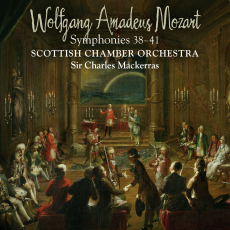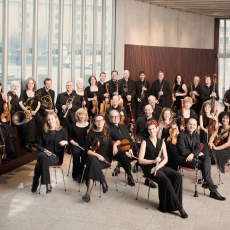Mozart Symphonies - SCO & Sir Charles Mackerras - MusicWeb International
If you've followed Sir Charles Mackerras's releases of late, you'll be well aware that his recent Beethoven cycle on Hyperion with this orchestra (apart from No.9) was greeted with pretty universal acclaim. This new two disc set of Mozart's four last symphonies has also been very warmly welcomed from just about every quarter, and it's easy to hear why.
I have been a fan of various performances from Mackerras's previous Mozart cycle on Telarc for many years (especially 40 and 41), and in many ways he proves to be his own most serious competitor. The basic approach to the music is remarkably similar, and the playing of the Prague Chamber Orchestra is first rate. However, there are a few things that jump out immediately and raise the bar on the newer set. One is the recording, which I always felt on Telarc to be a shade reverberant and a touch too distant; this is borne out by A/B comparison with the new, where the balance and acoustic are just about perfect to my ears. The orchestral detail emerges with phenomenal clarity, and it really does feel as if you have your favourite seat in an excellent concert hall. Then there is the actual playing, which is not necessarily better from the Scottish Chamber Orchestra, just a bit more characterful in every department. The strings are a touch less strident, having great unanimity but a degree of warmth, and the all-important wind writing is delivered with great aplomb and virtuosity.
As I say, Mackerras's speeds and phrasing are very similar to before, but he does find certain details that can only come from years of experience and living with great music. He still favours brisk speeds, taut rhythms and a playing style which sits fairly comfortably between ‘authentic' and modern, especially with regard to vibrato, of which he allows a judicious - and welcome - use. One might take issue with some of the minuets, say, which are sometimes (as in the ‘Jupiter') so quick as to miss a degree of underlying seriousness. But just as quickly, if one compares this approach to more hard-line interpretations, such as the recent René Jacobs/Freiburg Baroque (Harmonia Mundi) or, even more extreme, Jos van Immerseel/ Anima Eterna (Zig Zag), one realizes that Mackerras is spot-on, with none of the almost absurd extremes indulged in by both those conductors in places. The question of repeats is a tricky one, and Mackerras, as before, opts for all repeats in all movements. Again, some may question the need for this in every piece - especially second half repeats - but it does seem right in the first movements, especially the ‘Prague', which runs to 18 minutes and suddenly appears to have a real Beethovenian grandeur. I suppose this is where the brisk speeds help to keep any negative feelings of ‘heavenly length' at bay, because one simply marvels all over again at Mozart's invention and inspiration.
I think Mackerras judges the introduction to Symphony 39 to perfection; it's in keeping with modern thinking in being fairly fast, but still sounds magisterial, unlike Immerseel, who goes at such a breakneck pace that any inherent stateliness is rather undermined. Once again in this glorious work, one can hear Mackerras the ex-bassoonist coaxing wonderful things from his players, as in the exquisite overlapping lines of the andante (track 5, 6:40 onwards). It all adds up to a performance sounds just right. The G minor has an intensity and sweep that simply bowl you over, and Mackerras seems to see the journey through these late works as a cumulative one, leading inexorably to the famous ‘Jupiter', with its astonishing technical originality. His earlier recording of this piece was good, but this is breathtaking; I've never heard the counterpoint of that incredible finale so crystal clear, yet retaining an almost improvisatory flair and abandon. This is playing that makes you simply think of Mozart the magician, never of attention-grabbing gestures.
It all adds up to a great achievement, a set worthy to stand as a benchmark for our time. Mozart scholar Neal Zaslaw's liner-note and the superb artwork and packaging simply seal the recommendation.

